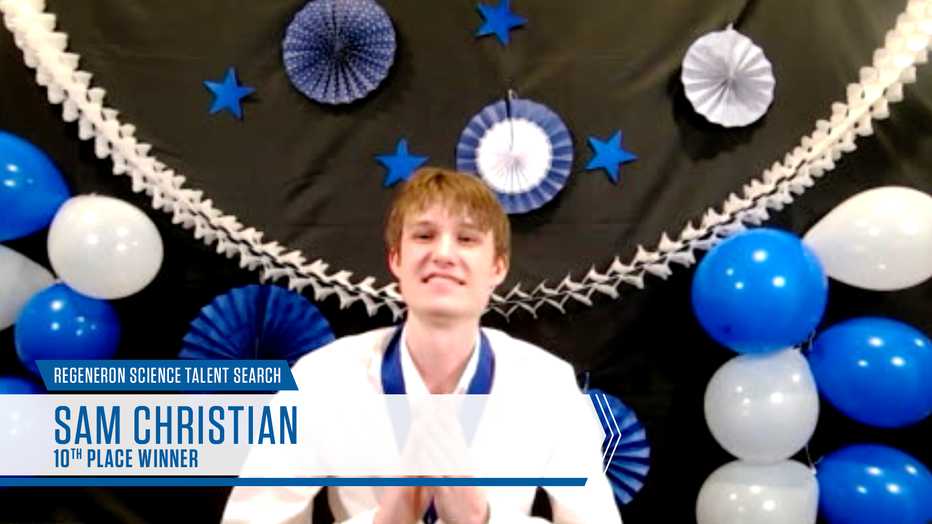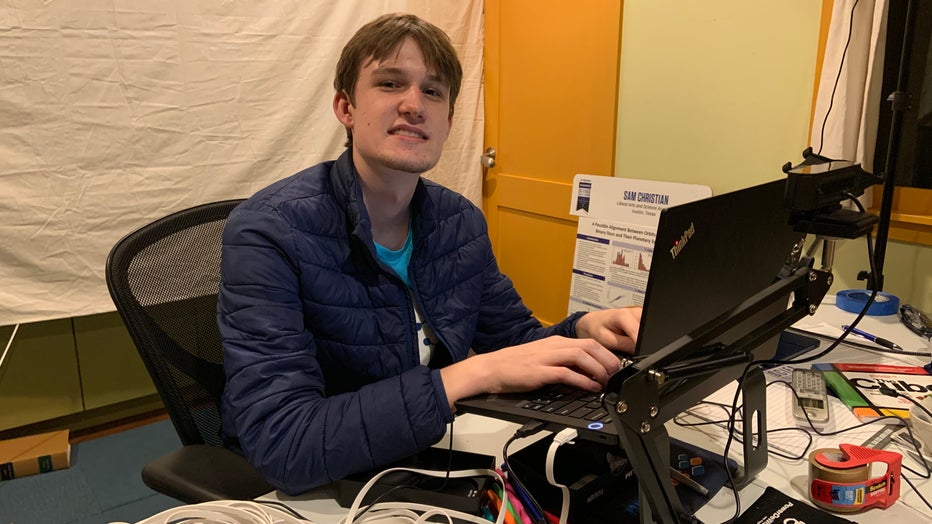Austin teen receives $40K award in 2021 Regeneron STEM competition
AUSTIN, Texas - An Austin teen has won a $40,000 award in the nation's oldest STEM competition for high school seniors.
17-year-old Sam Christian placed tenth in the 2021 Regeneron Science Talent Search for his research looking at computationally modeled data from numerous observatories and NASA’s TESS telescope to identify and observe movements of planets in 69 wide-binary star systems.
He showed that the orbits of these exoplanets align to a great extent with the orbit of their binary system. His findings, when applied to a larger sample, could shed additional light on how planets are formed and evolve, says a release.
DOWNLOAD THE FOX 7 AUSTIN NEWS APP

Sam Christian, 17, of Austin placed tenth in the 2021 Regeneron Science Talent Search for his research looking at computationally modeled data from numerous observatories and NASA’s TESS telescope to identify and observe movements of planets in 69 wi (Regeneron Science Talent Search)
SIGN UP FOR FOX 7 AUSTIN EMAIL ALERTS
Christian, a student at the Liberal Arts and Science Academy, was one of 40 finalists which were awarded more than $1.8 million in the virtual competition.
The $250,000 top award went to 18-year-old Yunseo Choi of New Hampshire for her project where she played theoretical "matchmaker" for an infinite number of things or people using matching algorithms.
The $175,000 second-place award went to 17-year-old Noah Getz of New York for his research where he adjusted the way computer models identify promising pharmaceutical compounds, which could make the discovery of new drugs, including for Alzheimer's and COVID-19, faster and less expensive.
The $150,000 third-place award went to 17-year-old Eshani Jha of California for her development of a biochar filtration system that removes microplastics, pharmaceuticals, pesticides, and heavy metals (such as arsenic, cadmium, lead, and mercury) from drinking water.

RELATED: North Texas student turns chalk hobby into business during pandemic
The fourth through ninth place winners are:
- 17-year-old Gopal Goel of Oregon received $100,000 for math research that made connections between two subjects regarding randomness and probability
- 18-year-old Timothy Qian of Maryland received $90,000 for a study of quantum metrology, which uses quantum entanglement to get more accurate measurements
- 16-year-old Vetri Vel of Maine received $80,000 his project engineering a deep learning system that combines a small computer and a thermal camera to detect heat signatures of a fallen person and immediately text for help
- 17-year-old Alay Shah of Plano, Texas, received $70,000 for the development of a diagnostic tool that tracks eye movement to identify neurological disorders that could become a low-cost alternative to MRIs
- 18-year-old Wenjun Hou of Oregon received $60,000 for using quantum computing to solve the well-known computer science question called the "knapsack problem" and designing quantum hardware to implement the central component of his algorithm
- 17-year-old Vivian Yee of Michigan received $50,000 for research on inequalities in COVID-19 incidence and outcomes in the counties of New York City, which found higher rates of transmission and death in more socially vulnerable communities and may help guide future policies and initiatives for public health
17-year-old Dasia Taylor of Iowa was named the Seaborg Award winner, chosen by the 40 finalists as the student who most exemplifies their class and the extraordinary attributes of nuclear chemist Glenn T. Seaborg, who won the Nobel Prize for Chemistry in 1951 and served on the Society’s Board of Trustees for 30 years.
RELATED: Texas teen wins $25K for work on possible COVID-19 solution
Each finalist not in the top 10 received $25,000. In total, Regeneron says it awarded $3.1 million in prizes through the Regeneron Science Talent Search 2021, including $2,000 to each of the top scholars and their schools.
Historically held in person in Washington, D.C., this is the second year in its 80-year history that the competition took place virtually due to the ongoing COVID-19 pandemic.

